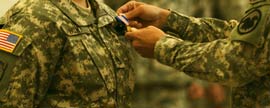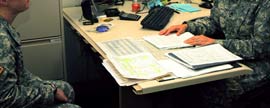Bottom line
If you were placed in the position you have the military authority to direct and supervise all Soldiers under your charge.
Discussion
In accordance with AR 600-20 paragraph 2-19 you should be senior to the individual by date of rank (DOR). If you are senior by date of rank the issue is cut and dry.
If however this individual is senior to you then TC 7-22.7 and aspects of AR 600-20 chapter 4 apply. As I stated above if you are placed in a position of authority to execute the duties of that position the Soldiers under your charge are resquired to follow your directives as long as they are legal, ethical, moral.
The extracts below support the information discussed above.
TC 7-22.7
4.25. Delegation of Authority. To meet the organization’s goals, officers delegate authority to NCOs in the NCO Support Channel who, in turn, may further delegate that authority. Unless restricted by law, regulation, or a superior, leaders may delegate any or all of their authority to their subordinate leaders. However, such delegation must fall within the leader’s scope of authority. Leaders cannot delegate authority they do not have and subordinate leaders may not assume authority that superiors do not have, cannot delegate, or have retained. The task or duty to be performed limits the authority of the leader to whom it is assigned.
AR 600-20
2–19. Precedence of relative grade, enlisted Soldiers
Among enlisted Soldiers of the same grade in active military Service, to include retired enlisted Soldiers on AD, precedence or relative grade will be determined as follows:
- According to DOR.
- By length of active Federal Service in the Army when dates of rank are the same.
- By length of total active Federal Service when a and b are the same.
- By date of birth when a, b, and c are the same—older is more senior.
4–2. Obedience to orders
All persons in the military Service are required to strictly obey and promptly execute the legal orders of their lawful seniors.
4–3. Military courtesy
- Courtesy among members of the Armed Forces is vital to maintain military discipline. Respect to seniors will be extended at all times (see AR 600–25).
Points to Consider
You might want to speak with your NCO and explain the difficulty you are having with this Soldier and state you would like to give the Soldier a counseling statement to ensure they understand they are to obey your instructions. Also have your NCO present at the counseling session but it is important you be the one providing the counseling statement. This is only a point for you to consider as only you can determine the appropriate course of action.
Sample Counseling
The counseling might look like this:
_______ (INSERT RANK/NAME), I am counseling you for insubordination. You have frequently questioned my orders, and stated that you do not have to follow my instructions. This counseling is to inform you that this behavior will not be tolerated. Effectively immediately this destructive and mutinous behavior will cease. Further conduct of this nature will result in the recommendation for punishment under the UCMJ. In addition any sedition, mutinous or similar behavior to promote or insight trouble within the team will be dealt with accordingly under the UCMJ.
As corrective training you will write a 500 word essay on the follow subject: Why Military Discipline and Obedience to Orders is important for unit cohesion. The essay is due ______(INSERT DATE/TIME)














